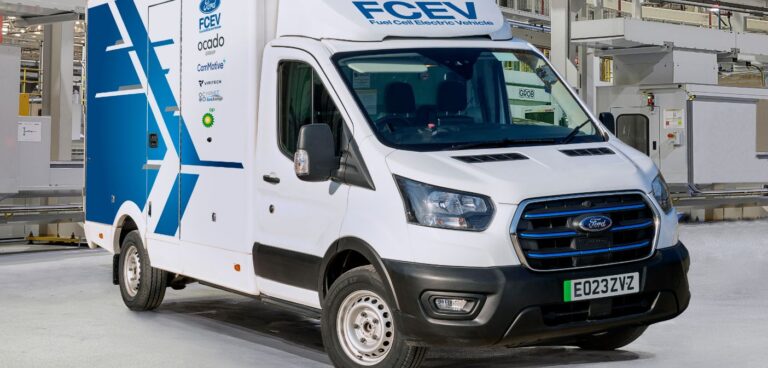Ford has announced a new research trial that will investigate the use of hydrogen as an on-board energy source for its E-Transit van series, which will run in the Thames Estuary area.
The automaker will explore how hydrogen fuel cell technology can be used to deliver more zero-emission range to E-transit customers that require heavy use of the vehicles. Examples of this include high mileages, maximum loads and ancillary equipment like chillers.
The project will be partially funded by Advanced Propulsion Centre (APC), non-profit organisation that helps fund UK-based research and development projects focused on low-carbon emission powertrains and fuel sources.
Ford’s consortium of six automotive technology companies and fleet operators will take part in the trial to help determine the supporting hydrogen refuelling infrastructure required.
What’s more, the pilot will be supported by engineers and E-Transit specialists from Dagenham and the company’s nearby Dunton Technical Centre in Essex.
Tim Slatter, chair of Ford in Britain, said: “Ford believes that the primary application of fuel cells could be in its largest, heaviest CVs to ensure they are emission-free, while satisfying the high daily energy requirements our customers demand.
“Ford has an unmatched history in the commercial vehicle sector with the indomitable Transit, and we are excited to be exploring new ways to make clean deliveries an option for even our hardest working vans on the road.”
Some of the other project partners are Bp, which will support capturing hydrogen usage and infrastructure requirements; Cambustion, which will help test the fuel cell system; Viritech, which will design hydrogen storage systems; and Cygnet Texkimp, which will provide the pressure vessels’ carbon fibre tooling.
Hydrogen fuel cells produce electricity by combining chemical energy from a fuel (hydrogen here) taken from an onboard tank with an oxidising agent (in this case oxygen). The resulting energy can thus be produced with zero emissions, extended range and quicker refuelling, according to Ford.
A test fleet of eight fuel cell Ford E-Transits will run for six-month periods during the three-year project until 2025. Test fleet data will be used to analyse the effects of the fuel cells on operating hours, overall costs and added range to the fleet.
The prototype Ford E-Transits will be fitted with a high-power fuel cell stack and what Ford describes as ‘significant’ hydrogen storage capability, which it hopes to optimise for safety, capacity, cost and weight.
This E-Transit fuel cell project supports Ford’s strategic vision of creating low-volume assembly upfit capability for hydrogen vehicles, with these trial vehicles being used to test current and future needs for the alternative fuel.
The hydrogen E-Transit project likewise supports Ford’s ‘Road to Better’ sustainability commitment, which outlines the company’s strategic ambition to have its European operations be its first region globally to become carbon neutral by 2035.





